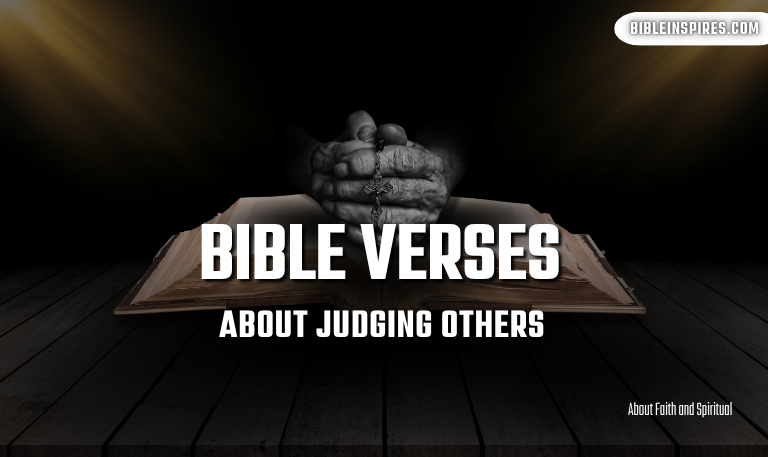Judging others is a topic that sparks strong feelings and often misunderstanding. You may have heard the famous phrase, “Judge not, lest ye be judged,” but what does the Bible truly say about judging others? Is judgment always wrong, or does Scripture provide guidance on when and how to judge fairly?
This article explores Bible verses about judging others, diving deep into biblical teachings on judgment, mercy, forgiveness, and discernment. We will clarify misconceptions, highlight key scriptures, and offer practical insights to help you apply these truths in your daily life.
1. Understanding Judgment in the Bible: A Deeper Look
What Does “Judging” Mean Biblically?
In biblical terms, judgment involves forming an opinion or deciding on the righteousness or sinfulness of a person’s actions. It is important to distinguish between:
Righteous judgment: Making fair and just assessments based on God’s truth.
Hypocritical judgment: Condemning others while ignoring one’s own faults.
The Bible encourages believers to pursue righteous judgment (John 7:24), but sternly warns against hypocritical or self-righteous condemnation.
Read Also: Bible Verses About Loving Everyone
2. Key Bible Verses About Judging Others
Here are some of the most pivotal verses addressing judgment in the Bible:
Matthew 7:1-5 — “Do Not Judge, Or You Too Will Be Judged”
“Do not judge, or you too will be judged. For in the same way you judge others, you will be judged…”
— Matthew 7:1-2 (NIV)
This passage reminds us to approach judgment with humility and self-awareness.
John 8:7 — “He Who Is Without Sin Among You, Let Him Cast the First Stone”
“Let any one of you who is without sin be the first to throw a stone at her.”
— John 8:7 (NIV)
Jesus teaches mercy and compassion, highlighting our shared imperfection.
Romans 14:10-13 — Accountability to God
“You, then, why do you judge your brother or sister? Or why do you treat them with contempt?”
— Romans 14:10 (NIV)
Paul emphasizes that ultimate judgment belongs to God, not humans.
James 4:11-12 — Warning Against Speaking Against Others
“Brothers and sisters, do not slander one another. Anyone who speaks against a brother or sister…judges them.”
— James 4:11 (NIV)
This cautions believers against harmful judgment that divides the community.
Luke 6:37 — “Do Not Judge, and You Will Not Be Judged”
“Do not judge, and you will not be judged. Do not condemn, and you will not be condemned. Forgive, and you will be forgiven.”
— Luke 6:37 (NIV)
This verse connects judgment with forgiveness and grace.
3. Common Misconceptions About Judging Others
Is Judging Always a Sin?
Many think judging is entirely forbidden in Christianity. However, the Bible differentiates between condemning judgment and discernment. Judging with humility, love, and truth can be necessary (John 7:24).
Judgment vs. Discernment: What’s the Difference?
Judgment: Passing final condemnation.
Discernment: Wise evaluation to guide actions and protect oneself or others.
The Bible encourages discernment to avoid deception or sin (1 Corinthians 2:15).
4. Avoiding Hypocritical Judgment: Biblical Principles
Self-Reflection Before Judgment
Jesus warns against judging others without first examining ourselves.
“Why do you look at the speck of sawdust in your brother’s eye and pay no attention to the plank in your own eye?” — Matthew 7:3-5
Practice Mercy and Compassion
Instead of harsh judgment, Scripture calls believers to show mercy (James 2:13) and forgive generously.
5. Judgment and Church Discipline
Holding Each Other Accountable in Love
The Bible supports correction within the church body for spiritual growth.
“Brothers and sisters, if someone is caught in a sin, you who live by the Spirit should restore that person gently.” — Galatians 6:1
Balancing Truth with Grace
Correcting others requires wisdom and love, avoiding condemnation (Ephesians 4:15).
6. Judging Others vs. Personal Responsibility
Judging others often distracts from self-improvement. The Bible calls believers to focus on their own spiritual growth (Romans 12:3) and encourages uplifting relationships.
7. Judgment and Forgiveness: Two Sides of the Same Coin
Forgiveness is a biblical antidote to judgment.
Forgiving others frees us from bitterness (Colossians 3:13).
Forgiveness reflects God’s mercy and love toward us (Matthew 6:14-15).
8. Consequences of Judging Others
Judgment leads to spiritual, emotional, and social consequences:
Spiritual: Harsh judgment can invite God’s judgment (Matthew 7:2).
Emotional: It breeds resentment and alienation.
Social: It fractures communities and harms relationships.
9. Encouraging Positive Judgment and Discernment
How to Judge Wisely
Base judgment on facts, not assumptions.
Exercise humility and avoid pride.
Consider the heart and context, not just actions.
10. Applying Bible Verses About Judging Others Today
Practical Steps
Practice empathy and patience.
Avoid snap judgments, especially online.
Cultivate a spirit of understanding over condemnation.
11. Stories and Parables About Judgment in the Bible
The Pharisee and the Tax Collector (Luke 18:9-14)
Shows the danger of self-righteousness.
Nathan Confronts King David (2 Samuel 12)
Demonstrates righteous rebuke with accountability.
The Woman Caught in Adultery (John 8:1-11)
Exemplifies mercy over condemnation.
Bible Verses About Judging Others FAQs
1. What does the Bible say about judging others harshly?
The Bible condemns harsh and hypocritical judgment, urging mercy and self-reflection (Matthew 7:1-5).
2. Is it a sin to judge someone?
Judging in itself is not always sinful, but condemning others without humility or love is warned against (John 7:24).
3. How can I avoid being judgmental according to the Bible?
Practice self-examination, mercy, forgiveness, and seek God’s guidance (Luke 6:37).
4. What Bible verse tells us not to judge?
Matthew 7:1 — “Judge not, that you be not judged.”
5. Can Christians judge others at all?
Yes, with righteous discernment and love, especially to protect and guide the community (1 Corinthians 5:12-13).
6. How do I know when it’s right to confront someone biblically?
When it is done in love, with humility, and aims for restoration, according to Matthew 18:15-17.
7. What is the difference between judgment and discernment?
Judgment condemns; discernment evaluates wisely and guides (Hebrews 5:14).
8. Does the Bible say we should forgive those we judge?
Yes, forgiveness is essential and linked with mercy (Colossians 3:13).
9. How can I stop feeling judged by others?
Focus on your identity in Christ and seek supportive, loving relationships (Romans 8:1).
10. What is the meaning of “speck and plank” in the Bible?
It teaches to correct your own faults before judging others (Matthew 7:3-5).
Conclusion
The Bible’s message on judging others is nuanced and calls for deep humility, compassion, and wisdom. While judgment is a necessary aspect of living a godly life—especially in discernment and accountability—Jesus and the apostles remind us to avoid hypocrisy and harsh condemnation. By embracing mercy, forgiveness, and self-reflection, believers can foster communities marked by love rather than division. Let these biblical teachings guide your heart and actions today, helping you live in grace and truth.

![Top 10 Bible Verses About Brotherhood and Love [Explained] 3 Top-10-Bible-Verses-About-Brotherhood-and-Love-[Explained]](https://bibleinspires.com/wp-content/uploads/2025/04/Top-10-Bible-Verses-About-Brotherhood-and-Love-Explained.png)
![11+ Bible Verses About God and Nature [2025] 4 11+-Bible-Verses-About-God-and-Nature-[2025]](https://bibleinspires.com/wp-content/uploads/2025/04/11-Bible-Verses-About-God-and-Nature-2025.png)
